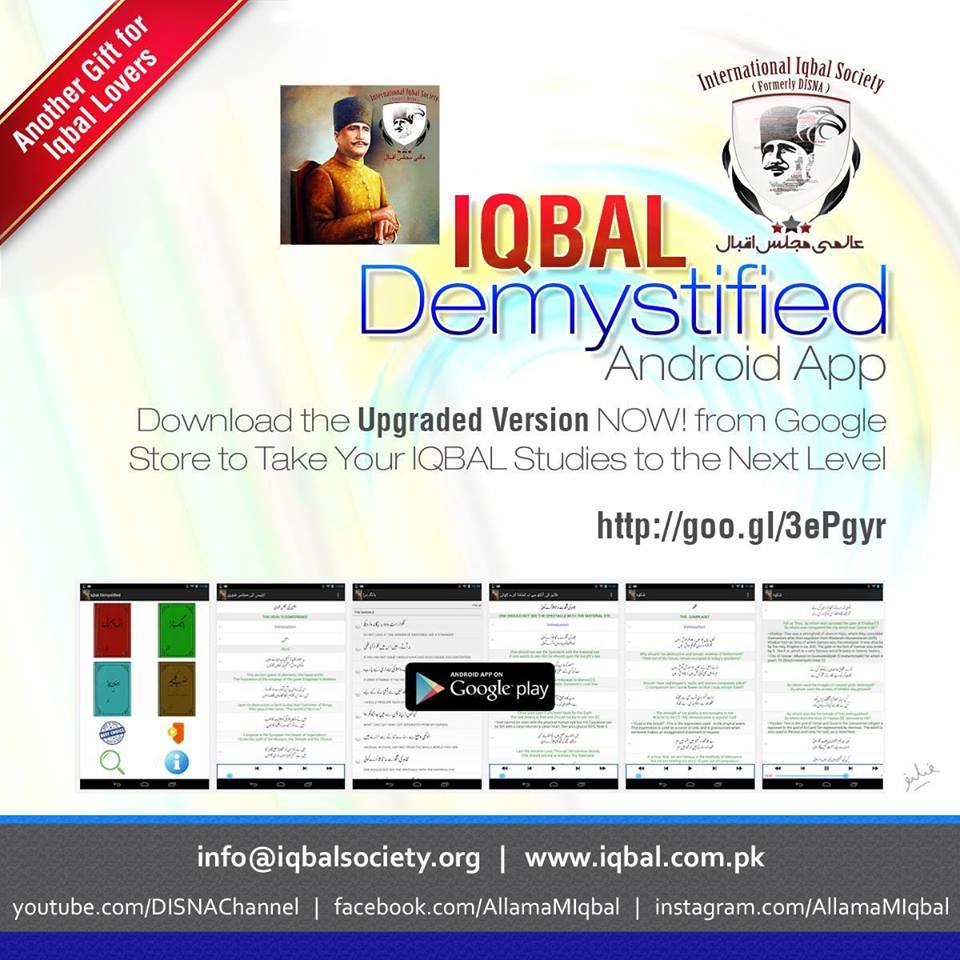Notes
- Parent Category: English Translations
- Hits: 1296
- Print , Email
1. The present translation follows the text of the second edition.
2. His criticism of Hafiz called forth angry protests from Sufi circles in which Hafiz is venerated as a master-hierophant. Iqbal made no recantation, but since the passage had served its purpose and was offensive to many he cancelled it in the second edition of the poem. It was omitted in my translation.
3. The principles of Islam, regarded as the ideal society, as set forth in the author's second poem, the Rumuz-i-BeKhudi or "Mysteries of Selflessness." He explains the title by pointing out that the individual who loses himself in the community reflects both the past and the future as in a mirror, so that he transcends mortality and enters into that life of Islam, which is infinite and everlasting. Among the topics discussed are the origin of society, the divine guidance of man through the prophets, the formation of collective life centres, and the value of History as a factor in maintaining the sense of personal entity in a people.
4. This view was held by the orthodox Imam Ahmad ibn Hanbal in its extreme (anthropomorphic) form.
5. Koran, ch. 23. v. 14. -Blessed is God. the best of those who create.
6. Cf. his note on "Islam and Mysticism (The Nw; Era, 1916, p. 250).
7. Here Iqbal adds : "Maulana Rumi has very beautifully expressed this idea. The Prophet, when a little boy, was once lost in the desert. His nurse Halima was almost beside herself with grief but while roaming the desert in search of the boy she heard a voice saying:
‘Do not grieve he will not be lost to thee;
Nay, the whole world will be lost in him.’
The true individual cannot be lost in the world; it is the world that lost in him. I go a step further and say, prefixing a new half-verse to a hemistich of Rumi Trans. 1. 1325):
In his will that which God wills becomes lost;
‘How shall a man believe this saying?’
8. Transl. 1. 289 foil.
9. According to the Tradition, -The true Faith is between predestination and free-will,"
10. Transl. 1, 673 follow. In a note on ,Our Prophes's criticism of contemporary Arabian poetry" (The New Era. 1916, p. 251) Iqbal writes : "The ultimate end of all human activity is Life glorious, powerful, exuberant. All human art must be subordinated to this final purpose, and the value of everything must be determined in reference to its life-yielding capacity The highest art is that which awakens our dormant will-force and braves us to face the trials of life manfully. All that brings drowsiness and makes us shut our eyes to Reality around, on the mastery of which alone Life depends, is a message of decay and death. There should be no opium eating in Art. The dogma of Art for the sake of Art is a clever invention of decadence to cheat us out of life and power."
11. Ibid. 1. 537 foll.
12. Ibid, 1. 631 foll.
13. Transal. 1. 1531 foll
14. Koran, ch. 23, v. 102.
15. Transl. 1, 15" foll.
16. Transl. 1, 323 foll.
17. Transl. 1, 435 foll.
18. Ibid. 1. 815 foll.
19. Transl. 1. 849 foll.
20. Ibid. 1. 893 foll.
21. Man already possesses the germ of vicegerency as God says in the Koran (ch. 2. v. 28) ; Lo! I will appoint a khalifa (vicegerent) on the earth." Cf. Transl 1,434.
22. Writing of "Muslim Democracy" in The New Era, 1916, p. 251. Iqbal says: -"The Democracy of Europe fear overshadowed by socialistic agitation and anarchical–originated mainly in the economic regeneration of European societies. Nietzsche, however, abhors this ’rule of the heard' and, hopeless of the plebeian, he bases all higher culture on the cultivation and growth of an Aristocracy of Supermen. But is the plebeian so absolutely hopeless ? The Democracy of Islam did not grow out of the extension of economic opportunity; it is a spiritual principle based on the assumption that every human being is a centre of latent power the possibilities of which can be developed by cultivating a certain type of character. One of the plebeian material Islam has formed men of the noblest type of life and power. Is not, then, the Democracy of early Islam an experimental refutation of the ideas of Nietzsche ?"
23. Jamshad one of the mythical Persian kings, is said to have possessed a marvellous cup in which the whole world was displayed to him.
24. The Sea of oman in a [name given by the Arabs to the Persian Gulf.
25. The holy well at Mecca
26. lqbal means to say that he will raise the value of his poetry by putting his deepest aspirations into it. The metaphor refers to the practice of herb-sellers who sprinke water on their herbs in order to make them heavier and fetch moremoney.
27. Jalaluddin Rumi the greatest mystical poet of Persia (A.D. 1207-1173). Most of his life was passed at lconium in Galatia. for which reason be in generally known as "Rumi. i.e. "the Auatolian."
28. This refers to the fatuous Masnavi of JaIal-uddin Rumi
29. Rue-seed. which is burned for the purpose of fumiation, crackles in the fire.
30. "Wine" signifies the mysteries. of divine love.
31. Majnun is the Orlando Furioso of Arabia.
32. Khansar. which lies abolut a hundred miles north
west of Isfahan, was the birth-Place Of several Persian poets.
33 Shirin was loved by the Persian Emperor Kbusrau Parwiz Farhad fell in love with her and cast himself down a precipice on bearing a false runmour of her death.
34. Abraham is said to have been cast on a burning pile by order of Nimrod and miraculously preserved from harm
35, I.e., so long as it remains as distinct individual,
36. Cf. Quran ch. 18. vv. 64-80. Khizr represents the mystic seer whose actions are misjudged by persons of less insight.
37. I.e., the reed was made into a flute.
38. For the sense which Iqbal attaches to the word "love," see the Introduction, p, xxv.
39. A prophet or saint.
40. See note on line 95, Tabriz is an allusion to Sbams-i-Tabraiz the spiritual director of Jalal-u'ddin Rumi
41. Najd. the Highlands of Arabia, is celebrated in love-remance, I need only mention Lial� and Majn�n.
42. Her father Hatim of Tai, is proverbial in the East for his hospitality.
43. The story of the pulpit that wept when Muhammad descended from it occurs. I think. in the Masnavi.
44. When according to Muhammadans belief, the sun will rise in the west.
45. A quotation from the Masnavi. The Prophet was buried at Medina.
46. Bayazid of Bistan died in A.D. 875. He refused to eat a water-melon. saying he had no assurance that the Prophet had even tested that fruit.
47. Muhammad used to retire to a cave On Mount Hira near Mecca. for purpose of solitary meditation.
48. Lat and Uzza were goddesses worshipped by the heathen Arabs- O neighborhood
49. Faran, name of a mountain in the of Mccea
50. Koran, ch. 2,v, 28. in them words, which were addressed to the angels. God foretold the creation of Adam.
51. This alludes to a story told of the Caliph Omar. who while riding a camel dropped his whip and insisted on dismounting in order to pick it up himself.
52. Khizr is supposed to have drunk of the Fountain of life.
53. The bubble is compared to an inverted cup. which of course receives nothing.
54. Alluding to a well-known miracle of the Prophet (Koran, ch. 54, v. 1).
55. Sheikh Sharafu'ddin of Panipat, who is better known as Bu Ali Qalandar, was a great saint. He died about A.D. 1325.
56. Amir Khusrau of Delhi, the most celebrated the Persian poets of India,
57. These expressions are borrowed from the Koran,
58. Quoted from the Masnavi.
59. The direct influence of Platonism on Muslim thought has been comparatively slight. When the Muslims began to study Greek philosophy, they turned to Aristotle. The genuine writings of Aristotle. however, were not accessible to them. They studied translations of books passing under his name, which were the work of Neoplatonists, so that what they believed to be Aristotelian doctrine was in fact the philosophy of Plotinus. Proelus, and the later Neoplatonic school. Indirectly, therefore, Plato has profoundly influenced the intellectual and spiritual development of Islam and may be called, if not the father of Mohammedan mysticism, at any rate its presiding genius.
60. I.e., it is worthless sg anyhow. In the East a brick is placed beneath or over the wine-jar. Some Muslim writers confuse Plato with Diogenes the Cynic, who is said to have lived in a cask.
61. i e., in his body.
62. Khizr, according to the legend, discovered the Fountain of Life in the Land of Darkness.
63. In this passage the author assails the Persian and Urdu poetry so much in favour with his contemporaries.
64. Arabic odes usually began with a prelude in which the poet makes mention of his beloved and her name is often Salma Here "the Salma of Araby" refers to purely Muslim ideals in literature and religion.
65. It is related that aim ignorant Hurd came to some students and besought them to instruct him in the mysteries of Sufism They told him that be must fasten a rope to the root of his house, then tie the loose end to his feet and suspend himself head downwards-, and that he must remain in this posture as long as possible, reciting continually some words of gibberish which they taught him. The poor man did not perceive that he was being mocked. He followed their instructions and passed the whole night repeating the words given him. God rewarded his faith. and sincerity by granting him illumination. so that he became a saint and could discourse, learnedly on the most abstruse matters of mystical theology. Afterwards he used to say. "In the evening I was Kurd but the next morning I was an Arab."
66. The religious law of Islam
67. The first article of the Mohammedan creed.
68. I.e., denies every object of worship except Allah
69. Like Abraham when he was about to sacrific Isaace. of (as Muslims generally believe) Ishmael.
70. The lesser pilgrimage (umra) in not obligatory like the greater pilgrimage (haij)
71. The original quotes part of a verse in the Koran (ch. 3. v. 86), where it is said, "Ye shall never attain unto righteousness until ye. give in aims of that which ye love."
72. "#., overcome the lusts of the flash.
73. Here Iqbal interprets in his own way the Sufi doctrine of the Insan al-kamil or Perfect Man, which teaches that every man is potentially a microcosm and that when be has become spiritually perfect. all the Divine attributes are displayed by him, so that as saint prophet he is the God-man. the representative and vicegerent of God on earth.
74. ie. his appearance marks the end of an epoch.
75. Koran ch. 2. v. 29. The Ideal Man is the final cause of creation.
76. Koran. ch. 17. v. 1, referring to the Ascension on the Prophet
77. For the white hand (of Moses) of Koran. ch. 7. v. 105. ch. 26. v. 32. and Exodus, ch. 4, v.6.
78. These four lives may allude to Jesus, regarded as a type of the Perfect Man.
79. Murtaza, "he. whom God is pleased," is a name of Ali Bu Turab means literally "father of earth."
80. A miracle attributed to Ali.
81. The fortress of Khaibar, a village in the Hijaz. was captured by the Muslim in A.D. 628. Ali Performed great feats of valour on this occasion.
82. A river of Paradise.
83. According to the Tradition of the Prophet, "I am the city of Knowledge and Ali is its gate."
84. See note on 1,213.
85. The burning pyre on which Abraham was thrown lost its beat and was transformed into a rose-garden.
86. The "trust" which God offered to Man and which Man accepted, after it had been refused by Heaven and Earth (Koran. ch. 33, v. 72), is the divine vicegerency, i.e., the duty of displaying the divine attributes.
87 A parody of the verse in the Masnavi quoted above. See 1.603.
88, Hajwiri author of the oldest Persian treatise on Sufism, was a native of Ghazna in Afghanistan. He died at Lahore about A D. 1072 Pir-i-Sanjar is the renowned saint, Mu'inuddin, head of the Chishti order of dervishes, who died in A D. 1235 at Ajmir.,
89. These lines correct the Sufi doctrine that means of Passing away from individuality the mystic attains to everlasting life in God.
90. i.e., allegorically. This verse occurs in the Masnavi.
91. i.e., it he swallow a diamond, he will die.
92. These, two lines indicate the gist of the coal's being
93. A mysterious bird, of which nothing is known except its same.
94. Rue-seed is burned for the purpose of fumigation.
95. "The badge of unbelief"; here the original has sinnar (Zwvapiov) i.e. the sacred thread worn by Zoroastrians and other non-Muslims,
96. Azar, the father of Abraham, was an idolater.
97. see Introduction P- xix, note 1.
98. i.e., that life Of the true Muslim displays to 11161" kind the ideal realised.
99. A celebrated Muslim saint who died at Lahore in A.D. 1635.
100. Shah Jahan.
101. Koran, ch. 50 v. 29.
102. This appears to be a pseudonym assumed by the author.
103. Jalaluddin Rumi.
104. Baba Kamaluddin Jundi For Shams-i-Tabriz and his relation to Jalaluddin Rumi see my Selected Poems from Divan-i-Shams-i-Tabriz (Cambridge).
105. Abraham refused to worship the sun, moon and stars, stars. saying, "I love not them that set" (Koran, 6. 6, v. 76).
106. See p. 91, note.
107. In the Masnavi Love is called ',the physician of our pride and self-conceit, our Plato, and our Galen.
108. The famous idol of Somnath was destroyed by Sultan Mahmud of Ghazna
109. The pilgrims are forbidden to kill game
110. See p. 10, note.
111. Founder Of one of the four great Mohammadan school of law.
112. i.e. turn you attention to the nature and meaning of Time.
113. The Prophet said, "I have a time with God of such sort that neither angel nor prophet is y peer." meaning (if we interpret his words according to the sense Of this passage) that he felt himself to be timeless.
114. The Prophet is reported to have said, "Do not abuse Time. for Time is God."
115. The glorious days when Islam first set out to convert and conquer the world.
116. The takbir is the cry "Allah-o-Akbar" "Allah is most great,"
117. Salman was a Persian, Bilal was Abyssianian. Both had been slaves and were devoted henchmen of the Prophet
118. i.e., affirmation of the Divine Unity.






